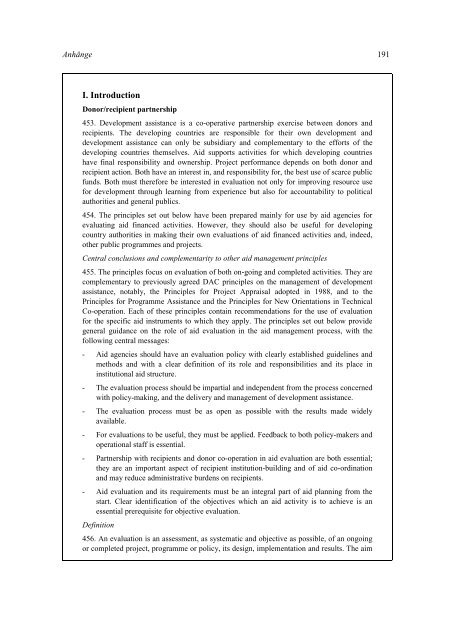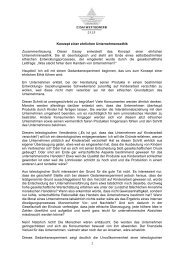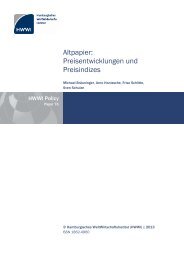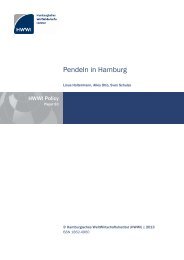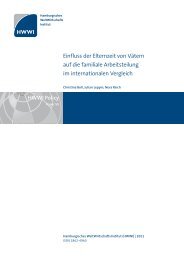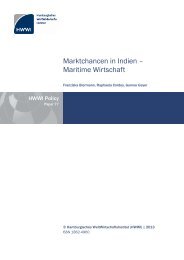Evaluation in der deutschen Entwicklungszusammenarbeit - HWWI
Evaluation in der deutschen Entwicklungszusammenarbeit - HWWI
Evaluation in der deutschen Entwicklungszusammenarbeit - HWWI
Sie wollen auch ein ePaper? Erhöhen Sie die Reichweite Ihrer Titel.
YUMPU macht aus Druck-PDFs automatisch weboptimierte ePaper, die Google liebt.
Anhänge 191<br />
I. Introduction<br />
Donor/recipient partnership<br />
453. Development assistance is a co-operative partnership exercise between donors and<br />
recipients. The develop<strong>in</strong>g countries are responsible for their own development and<br />
development assistance can only be subsidiary and complementary to the efforts of the<br />
develop<strong>in</strong>g countries themselves. Aid supports activities for which develop<strong>in</strong>g countries<br />
have f<strong>in</strong>al responsibility and ownership. Project performance depends on both donor and<br />
recipient action. Both have an <strong>in</strong>terest <strong>in</strong>, and responsibility for, the best use of scarce public<br />
funds. Both must therefore be <strong>in</strong>terested <strong>in</strong> evaluation not only for improv<strong>in</strong>g resource use<br />
for development through learn<strong>in</strong>g from experience but also for accountability to political<br />
authorities and general publics.<br />
454. The pr<strong>in</strong>ciples set out below have been prepared ma<strong>in</strong>ly for use by aid agencies for<br />
evaluat<strong>in</strong>g aid f<strong>in</strong>anced activities. However, they should also be useful for develop<strong>in</strong>g<br />
country authorities <strong>in</strong> mak<strong>in</strong>g their own evaluations of aid f<strong>in</strong>anced activities and, <strong>in</strong>deed,<br />
other public programmes and projects.<br />
Central conclusions and complementarity to other aid management pr<strong>in</strong>ciples<br />
455. The pr<strong>in</strong>ciples focus on evaluation of both on-go<strong>in</strong>g and completed activities. They are<br />
complementary to previously agreed DAC pr<strong>in</strong>ciples on the management of development<br />
assistance, notably, the Pr<strong>in</strong>ciples for Project Appraisal adopted <strong>in</strong> 1988, and to the<br />
Pr<strong>in</strong>ciples for Programme Assistance and the Pr<strong>in</strong>ciples for New Orientations <strong>in</strong> Technical<br />
Co-operation. Each of these pr<strong>in</strong>ciples conta<strong>in</strong> recommendations for the use of evaluation<br />
for the specific aid <strong>in</strong>struments to which they apply. The pr<strong>in</strong>ciples set out below provide<br />
general guidance on the role of aid evaluation <strong>in</strong> the aid management process, with the<br />
follow<strong>in</strong>g central messages:<br />
- Aid agencies should have an evaluation policy with clearly established guidel<strong>in</strong>es and<br />
methods and with a clear def<strong>in</strong>ition of its role and responsibilities and its place <strong>in</strong><br />
<strong>in</strong>stitutional aid structure.<br />
- The evaluation process should be impartial and <strong>in</strong>dependent from the process concerned<br />
with policy-mak<strong>in</strong>g, and the delivery and management of development assistance.<br />
- The evaluation process must be as open as possible with the results made widely<br />
available.<br />
- For evaluations to be useful, they must be applied. Feedback to both policy-makers and<br />
operational staff is essential.<br />
- Partnership with recipients and donor co-operation <strong>in</strong> aid evaluation are both essential;<br />
they are an important aspect of recipient <strong>in</strong>stitution-build<strong>in</strong>g and of aid co-ord<strong>in</strong>ation<br />
and may reduce adm<strong>in</strong>istrative burdens on recipients.<br />
- Aid evaluation and its requirements must be an <strong>in</strong>tegral part of aid plann<strong>in</strong>g from the<br />
start. Clear identification of the objectives which an aid activity is to achieve is an<br />
essential prerequisite for objective evaluation.<br />
Def<strong>in</strong>ition<br />
456. An evaluation is an assessment, as systematic and objective as possible, of an ongo<strong>in</strong>g<br />
or completed project, programme or policy, its design, implementation and results. The aim


